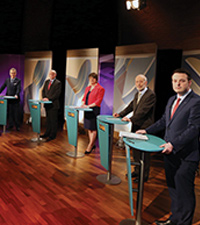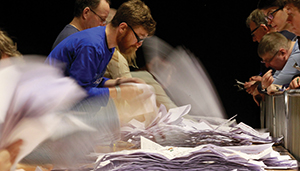Election 2016
Adam Morton takes a look ahead to the Assembly election as all of the parties have now confirmed their candidates.
At the end of March the Northern Ireland Assembly was dissolved and nominations for candidates to stand in the forthcoming Northern Ireland Assembly elections have now closed. Each of the 18 constituencies will elect six MLAs for the last time
 as the next Assembly election will see the number of MLAs returned to Stormont reduced to 90.
as the next Assembly election will see the number of MLAs returned to Stormont reduced to 90.
A total of 276 candidates have been nominated to stand in this election. This is an increase on the number of candidates who stood in the same election five years ago, when 218 candidates were in the race. The party with the most candidates is theDUP who will be fielding 44 candidates, Sinn Féin will field 39, the UUP 33, SDLP 24, Alliance Party 23, Green Party 18, TUV 15, UKIP 13 and the Conservative Party will run 12 candidates.
The number of female candidates has doubled from the last election with 76 running this time compared to 38 in 2011. This is up from just 17 per cent of the overall number of candidates in 2011 to more than 27 per cent now.
The seats with the most competition are in East Belfast, South Belfast, North Belfast and West Tyrone. In each of these constituencies, 18 candidates are vying for the six available seats. The seats in West Belfast, Mid Ulster and South Down have attracted the least interest with just 12 candidates contesting each constituency.
Constituencies to watch
If one thing can be guaranteed before the votes have been cast and counted it is that change is coming to South Belfast. None of the candidates elected as MLAs in 2011 are contesting this election. The Alliance Party’s Anna Lo, who topped the poll at the last election has decided not to run again, as has the UUP’s Michael McGimpsey. Other names absent from the constituency’s ballot papers include the DUP’s Jimmy Spratt, the former leader of the SDLP Alasdair McDonnell and party colleague Conall McDevitt and Sinn Féin’s Alex Maskey.
South Belfast is home to a diverse range of cultures and nationalities and this means that for a candidate to win the seat they will have reach out beyond their traditional support base. Sinn Féin who are hoping to win one seat in the constituency have nominated only one candidate, Máirtin Ó Muilleoir. The SDLP hopes to retain its two seats and have nominated two of the party’s previously co-opted MLAs Claire Hanna and Fearghal McKinney.
The Alliance Party is also hoping to return two seats and has nominated the former head of the community relations council Duncan Morrow and Paula Bradshaw. The DUP has nominated former special advisor and co-opted MLA Emma Little Pengelly and Belfast’s former Deputy Lord Mayor Christopher Stalford, while the UUP has nominated former barrister and Westminster advisor Rodney McCune.
Another constituency that will be watched with avid interest is the showdown in Foyle between Sinn Féin’s Martin McGuinness and SDLP leader Colum Eastwood. McGuinness has represented Mid Ulster since 1998 but has made the change to seek election in his home city. His party is hopeful that having his name on the ticket will see its tally increase in the constituency from two MLAs to three. However, Eastwood remains confident that his party will retain its three seats.
The DUP has held a seat in Foyle since 1998, however this year that seat will be hotly contested with the party nominating Gary Middleton as its candidate, former party member Maurice Devenney running as an independent and the UUP running Julia Kee.
There will be similar drama in the mainly nationalist constituency of South Down as the political careers of Jim Wells and John McCallister hang in the balance.
Wells, who had to resign as health Minister is running as the constituency’s only DUP candidate. At the general election last year Wells found himself almost 500 votes down on the less well-known Ulster Unionist councillor Harold McKee but is hopeful of a stronger performance at the polls this time round. Another candidate marred in controversy and fighting for his political survival is former UUP and NI21 MLA John McCallister who is running as an independent and remains hopeful that his
positive campaign will see him returned to the Assembly on 6 May.
 Generational shift
Generational shift
Regardless of these battles at the ballot box, the Assembly election will herald a generational shift in Northern Ireland’s politics. Thanks to the co-option system some seasoned veterans have already departed the scene, while others have chosen to retire with the expiration of the Assembly’s mandate.
Undoubtedly the biggest name not on any ballot paper is former DUP leader Peter Robinson who decided to announce his departure from politics at the end of last year following the signing of the Fresh Start Agreement. The high point of his political career was undoubtedly leading the DUP to its 38-seat haul at the last assembly election. He is replaced as a party candidate in East Belfast by former Castlereagh councillor Joanne Bunting.
The first republican Speaker of the Northern Ireland Assembly, Mitchel McLaughlin also announced his decision to retire in November. Having been a member of Sinn Féin for 50 years he was elected to Stormont in 1998 as a member for Foyle and was part of Sinn Féin’s negotiating team for the Good Friday Agreement in 1998 and the St Andrew’s agreement in 2006.
Also preparing to depart from political life is the first nationalist mayor of Belfast, the SDLP’s Alban Maginness. He won his assembly seat in 1998 but as the party begins its renewal under new leader Colum Eastwood, his retirement paves the way for Nichola Mallon, another former Belfast mayor to stand for the party in North Belfast.
The assembly’s oldest member, the UUP’s Samuel Gardiner won’t be returning to the assembly next year after his party decided not to select him as a candidate, while the UK’s first ever Chinese parliamentarian, Anna Lo will also be a notable absentee.
The former leader of NI21, Basil McCrea has announced that he will not be returning to Stormont and will instead pursue a new career outside politics. Elected as an Ulster Unionist he and John McCallister quit the party within hours of each other to form NI21. However, less than a year later, the pair had a bitter public dispute and the party imploded.
With some of these familiar faces no longer present at Stormont it is clear that the next assembly will look very different to the last one.





